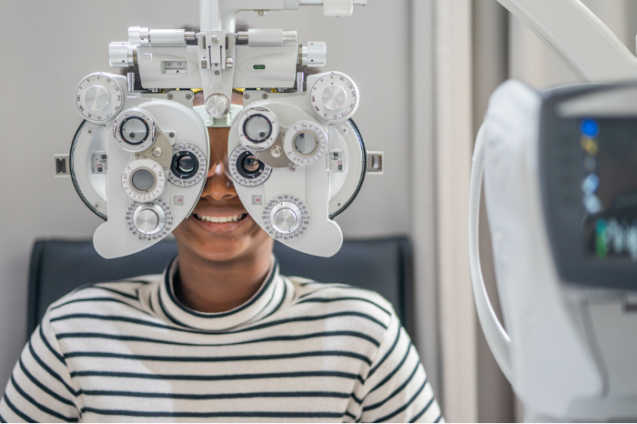The Ghana Health Service (GHS) has urged employers to ensure adequate eye care protection for their workforce, as a key strategy for enhancing productivity levels.
Dr Hornametor Afake, the Head of the Eye Care Unit, GHS, who gave the advice, said studies had shown that about 80 per cent of all sight losses were preventable or treatable.
“A slightest vision impairment could reduce one’s productivity by 10 per cent and their accuracy by 22 per cent,” he said.
Speaking at an event to commemorate the 2023 World Sight Day on the theme: “Love your Eyes at Work,” which aimed at directing the world’s attention on eye health issues, raising awareness of the 1.1 billion people globally, who did not have access to eye care services.
Dr Afake said the year’s campaign focused on the importance of eye health at the workplace, stressing that eye health unlocked human potential and was recognised by the World Health Organisation (WHO) as critical to achieving the Sustainable Development Goals (SDGs).
The GHS, in collaboration with some eye care partners, has carried out free eye screening exercises for workers and employees in selected institutions across the country, including the Graphic Communications Group Limited in Accra, as part of the activities to mark the day.
Dr Afake said global statistics showed that there were 2.2 billion people with a near to distance vision impairment, but almost half of these impaired visions could have been prevented through timely access to care.
He mentioned the leading causes of vision impairment and blindness as uncorrected refractive errors and cataracts, adding that although vision loss could affect people of all ages, those over 50 years old were at greater risk.
Again, over 90 per cent of persons with uncorrected vision loss lived in low-and middle-income countries such as Ghana.
Ghana had a blindness prevalence of 0.47 per cent, approximately 230,000 people, which was higher in rural areas (0.79 per cent), than the (0.67 per cent) in urban centres, while those with severe visual impairment represented 1.07 per cent of the total population.
Percentage wise, cataract topped the causes of blindness with 54.8, (127,000 people), followed by glaucoma 19.4, representing 44,500 persons, posterior segment 12.9 (30,000 people) and cornea opacity 11.2, which meant (26,000 people).
Dr Afake said poor eye health could negatively impact on education, economic wellbeing and quality of life of individuals, families and their communities, lead to isolation of sufferers, causing depression and anxiety as well as poor work productivity among others.
Although there were effective eye care interventions ranging from promotion, prevention, treatment to rehabilitation, with cost-effective mediations like use of spectacles to correct refractive error and cataract surgery to restore vision, the current cost of acquiring eyewear was not covered under the National Health Insurance Scheme (NHIS).
“It is our desire to see the inclusion of spectacles on the NHIS list, at least for children,” and requested the support of corporate organisations, health partners and the Ministry of Health, to consider including all relevant antiglaucoma drugs on the benefit list, to prevent irreversible blindness in people, he said.
He said Ghana’s two new ambitious eye health targets included addressing the huge unmet needs for these services by achieving 40 per cent increase in effective coverage for refractive error and 30 per cent for cataract respectively by 2030.
He emphasised the key role of Optometrists in meeting the set targets and pleaded with practitioners to accept postings to other districts, to make eye care accessible and affordable for everyone.
Mr Emmanuel Agyei Arthur, the Communications Manager, GCGL, thanked the GHS for the partnership, saying the exercise was crucial for all journalists to ensure work accuracy. World Sight Day, which is coordinated by the International Agency for the Prevention of Blindness (IAPB), is observed annually on October 12, to raise awareness of blindness and vision impairment as major public health and development issues.
Latest Stories
-
Livestream: Newsfile discusses Economic Dialogue, corruption fight land loot
23 minutes -
Fire engulfs 2 shops at Tudu, now under control
33 minutes -
Adongo appointed Finance Committee Chair as Parliament reeshuffles leadership
47 minutes -
Amin Adam, Gideon Boako lead Minority bench on Finance
1 hour -
If you don’t make time, you’ll never have time – Pastor Brian Amoateng urges Gen Zs
2 hours -
Pastor Brian Amoateng recounts how a gospel song inspired him to quit clubbing
2 hours -
Third edition of Women of Valour held in Paris
2 hours -
AMOSA 2000 organises health screening for host community
2 hours -
International Women’s Day 2025: DWM calls for urgent action to accelerate Gender Equality
2 hours -
Agalga, Ntim Fordjour lead Parliament’s Defence & Interior Committee
3 hours -
MTN Ghana champions women’s empowerment at National Women’s Summit 2025
10 hours -
Volta Council of State rep donates motorcycles to support journalists in the region
11 hours -
Cabinet approves construction of second gas processing plant
12 hours -
Whitray Junior Tennis Open 2025 begins in Accra
13 hours -
Judith Adjobah Blay confirmed as Ghana Gas Ag. MD; Robert Lartey elevated to Deputy MD
14 hours

